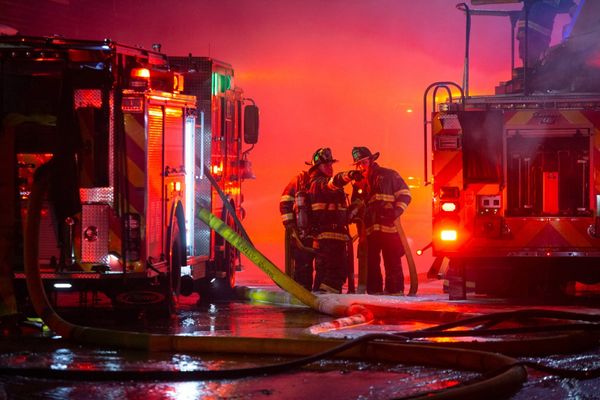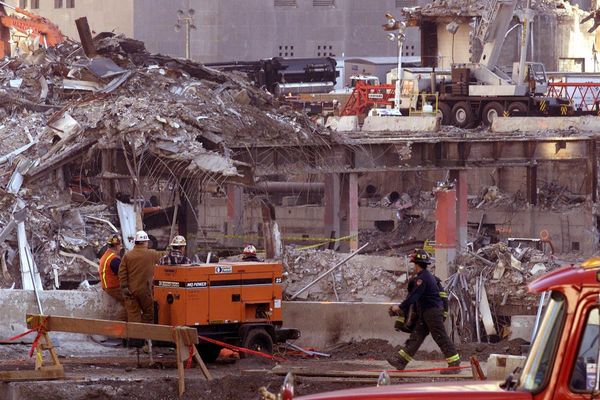
The evacuation train that was supposed to arrive in the Ukrainian town of Kramatorsk last Friday was late.
Andrei Kovalov was standing on the busy platform waiting for the service that would take him west, far away from the fighting, which is on the verge of engulfing his home town of Bakhmut in Donetsk. The 45-year-old was among up to 4,000 other civilians at the train station that morning fleeing the advance of Russian troops across the country’s east. The station was hot and crowded, witnesses said; everyone was willing to stand on the long train journey, if it meant at least they could leave.
The war managed to find them anyway. Before the train to Dnipro pulled in, two ballistic missiles exploded over the railway station building, dropping deadly cluster munitions – illegal under international law because of the indiscriminate damage they cause over a wide area – all over the concourse and baggage hall.
“I remember it very clearly. I thought I could hear a plane, and then I was thrown on the floor,” Kovalov said from his hospital bed at a first line response hospital in the Dnipropetrovsk region. The Ukrainian authorities asked that the medical facility was not identified, as it is used for treating civilian and military casualties.
“The first minute was total chaos. The emergency response tents caught fire, cars caught fire. There was blood and smoke everywhere. Then people started shouting for everyone to get out of the station. Everyone was running. I tried to run but I fell. I didn’t realise until then that I had blood all over me and holes in my body.”

The leather worker was injured by shrapnel that hit his shoulder and lacerated both his legs. He was given first aid and taken to the hospital, and doctors there are hopeful he should eventually be able to walk again.
Kovalov’s injuries are devastating and he is still in great pain, but he escaped alive; 57 people were killed in the Kramatorsk attack and another 109 were injured in one of the worst losses of life in a single incident in the six-week-old war to date. No soldiers were at the station at the time two Soviet-era Tochka-U missiles struck the area, Ukrainian officials said: most of those present were women and children.
In the aftermath of the attack, footage from the station showed streaks of blood over the ground and large stacks of unclaimed luggage. Mobile phones rang from the bags as families tried to find out if their loved ones had survived.
The casing of one of the rockets, which fell on the grass outside the front of the railway station, had been daubed in white paint with a message in Russian: za detei – for, or on behalf of, the children. But Moscow has denied it carried out the deadly strike, claiming instead that Ukraine’s armed forces are to blame. Ukraine’s president, Volodymyr Zelenskiy, called the Kramatorsk attack an act of “evil that has no limits”.
“I have no doubt that Russia did this. I remember all the people around me. Someone died right in front of me,” Kovalov said. “One woman was screaming and dragging her child. He was missing body parts. Eventually I was able to message my mother to tell her I was OK. She had already called around all of the morgues in the region looking for me.”
Volodymyr Vakulenko’s family also had a narrow escape. Vakulenko, 67, and his wife, Halyna, 63, were at the train station bidding goodbye to their grandson, his wife and their two-year-old son as they tried to get a train to the western city of Lviv.
Feeling claustrophobic inside the busy baggage hall, Vakulenko had gone back outside to wait in the car when the missiles hit. Shrapnel pierced his lungs, and narrowly missed his heart, his surgeon said on Tuesday, after Vakulenko’s successful second surgery.

Natalia, their grandson’s wife, threw herself over her child during the attack and was mildly injured, but the younger members of the family were soon able to leave for the west of the country.
“Thank God for the doctors. [Volodymyr] is only here because of them,” said Halyna, wiping away tears at her husband’s bedside as she showed the Guardian one of the small, dense pieces of metal the doctors removed from his chest cavity. “Tiny children lying dead. Imagine living 63 years just to see this,” she said. “There were two trains coming that day, everyone knew there was going to be a lot of civilians. The Russians say they are helping us. Thank you for this kind of help.”
The Kremlin has been accused by human rights organisations and war crimes investigators of carrying out airstrikes and shelling targeting civilian infrastructure in its “special military operation” aimed at overthrowing the pro-western Kyiv government. Summary executions, rapes and the torture of civilians in territory it controls have also horrified the world.
According to estimates released by the Kyiv School of Economics on Monday, almost 600 educational institutions and 205 medical facilities have been damaged, destroyed or seized in the invasion so far.
In addition to the airstrike on Kramatorsk’s train station full of fleeing civilians, Moscow has also targeted a maternity hospital in the besieged city of Mariupol, killing four and leading to one stillbirth, while an attack on a theatre being used as a bomb shelter in the same city is believed to have killed about 300 people.
“The things the Russians are doing are shocking and cruel. It’s much worse than 2014,” said the director at the hospital treating Kovalov and Vakulenko, who has managed the facility in the eight years since conflict in the Donbas broke out.
Her staff treated 85 people immediately after the Kramatorsk incident. Most patients have since been transferred to other hospitals around the country, but Kovalov and Vakulenko, along with a deeply traumatised woman who lost her child in the attack, remain in her care.
“We are used to treating trauma, bullet wounds, shrapnel from mines and rockets,” she said. “But I still don’t understand how people can do this. I didn’t understand then, and I don’t understand now.”







